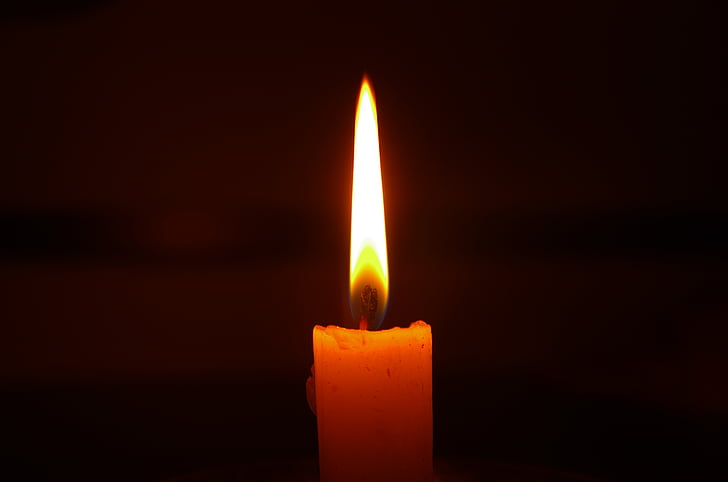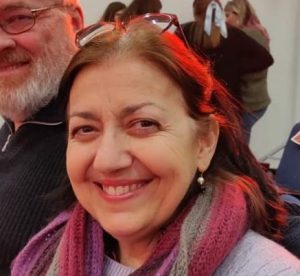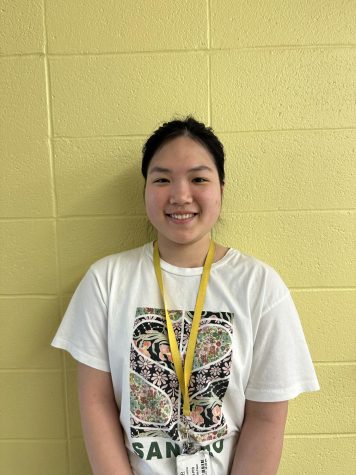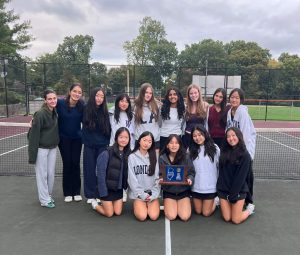Don’t Move On, Move Forward
May 10, 2023
I have one rule for myself that I always follow during school breaks: Don’t check school emails, don’t check grades, and don’t check Google Classroom. Yet, Wednesday morning of the April break, I felt a strong impulse to check my school email and break the sacred rule I had kept since my freshman year. The email I checked that morning changed my life.
Dear THS Parents, Students, and Staff,
It is with great sadness that we report the death of one of our staff members, Dr. Helen Coyle, Supervisor of Secondary Curriculum and Instruction – Science, who died Monday, April 3, after a brief illness.
I stood in a fixed position, hitting refresh on my phone again and again, denying the words I was reading. Unlike the movies where actors immediately sink to their knees, sobbing unconsciously when their loved ones die, I felt perfectly normal. No tears, no dropping down to the floor, no nothing. I wrapped myself in a blanket of preoccupied life—spending my entire day at the lab doing experiments, studying for upcoming AP exams, and having lunch with my friends. As I write this piece and reflect on those few days before attending her funeral, I realize I purposely overworked myself. Every second that I stayed unoccupied, death’s fiendish tongue whispered my teacher’s name—constantly reminding me of the inescapable reality of loss. But at that moment, I pretended I was untouched, unscathed, and unharmed because accepting meant I would never see Dr. Coyle again.
It was Friday that week, at the funeral, that death finally penetrated my awareness. I sat in the last row of the cathedral, watching teachers and classmates I see every day at school standing in front of Dr. Coyle’s coffin. Death suddenly seemed imminent and vivid. I did not know that Dr. Coyle’s email congratulating me for being named a finalist in the research competition would have been our last email exchange. I did not know that Dr. Coyle’s promise to meet after spring break to discuss my science project would be a promise that cannot be kept. I did not know that I would have to experience death.
Never having experienced losing someone, I think that death was an imaginative concept for me. Death was a dramatic event often used in stories I saw in books and movies. Death was a sad event that many people experience in their life, except me. I now realize how indifferent, ingenuous, and insensible I was. The inspirational teacher she always was, Dr. Coyle gave her final teaching even through her passing: she taught me to appreciate the little things in life. The little things in life—having breakfast with my family every weekend morning, socializing with my friends at school, learning new things in my classes, dreaming about my future—that I took for granted in the past can be a wish for others. I am grateful to be alive and will continue to strive to become someone who understands that what matters in life are small things.
This does not mean that I am ready to move on. Truthfully, I do not think I will ever be able to or need to move on from Dr. Coyle—she is still present. Walking down the hallway, I abruptly stop and turn around whenever I see a substitute teacher with a similar height and hairstyle to Dr. Coyle. I unconsciously plan to visit her office during science research class to discuss my project. Dr. Coyle is indelible and present in my life because her teaching, advice, and influence made me who I am today. So, I will not move on from her but move forward with Dr. Coyle. The cherished memories I have of her spark me to pursue what I love and pour my heart into my passion. Conducting experiments, writing papers for publication, and presenting my results to various people will be my ways of paying tribute to Dr. Coyle. To be able to dream and have the opportunity to pursue my passion—of these, I am thankful.
In loving memory of a dear teacher, Dr. Coyle.


















































































































































